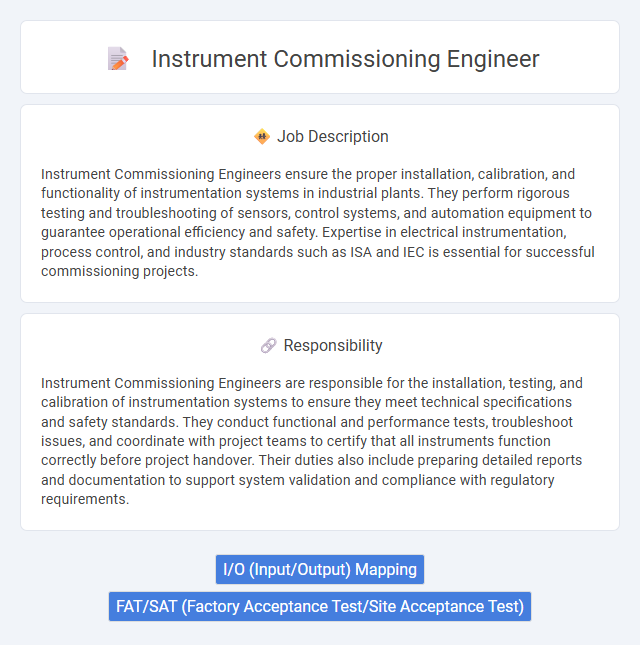
Instrument Commissioning Engineers ensure the proper installation, calibration, and functionality of instrumentation systems in industrial plants. They perform rigorous testing and troubleshooting of sensors, control systems, and automation equipment to guarantee operational efficiency and safety. Expertise in electrical instrumentation, process control, and industry standards such as ISA and IEC is essential for successful commissioning projects.
Individuals with strong analytical skills and attention to detail are likely to be well-suited for the role of an Instrument Commissioning Engineer. Those comfortable working in dynamic, sometimes high-pressure environments where precise troubleshooting is required may find this job fulfilling. It is probable that candidates who enjoy technical challenges and collaboration with multidisciplinary teams will thrive in this position.
Qualification
Instrument Commissioning Engineers require a strong background in instrumentation engineering, typically holding a bachelor's degree in electrical, electronics, or instrumentation engineering. Proficiency in installation, calibration, and troubleshooting of control systems like PLCs, DCS, and field instruments is essential. Certifications in safety standards and industry-specific training, such as ISA or IEC, enhance employability and technical expertise.
Responsibility
Instrument Commissioning Engineers are responsible for the installation, testing, and calibration of instrumentation systems to ensure they meet technical specifications and safety standards. They conduct functional and performance tests, troubleshoot issues, and coordinate with project teams to certify that all instruments function correctly before project handover. Their duties also include preparing detailed reports and documentation to support system validation and compliance with regulatory requirements.
Benefit
Instrument Commissioning Engineers likely benefit from hands-on experience with cutting-edge technology and complex systems, enhancing their technical skills and career prospects. They may enjoy opportunities for travel and exposure to diverse projects, which can broaden their industry knowledge and professional network. Job security and competitive salaries are often probable in this specialized role due to high demand in sectors like oil and gas, power generation, and manufacturing.
Challenge
Instrument Commissioning Engineer roles often involve the challenge of rapidly diagnosing and resolving complex instrumentation issues under tight project deadlines. There is a high probability that adapting to evolving technologies and strict safety standards will test problem-solving skills and technical knowledge. Navigating unpredictable site conditions may further increase the complexity of ensuring accurate and efficient commissioning processes.
Career Advancement
Instrument Commissioning Engineers gain expertise in installing, calibrating, and testing sophisticated instrumentation systems across industries such as oil and gas, power generation, and manufacturing. Mastery of advanced diagnostics, control systems, and field instrumentation enables progression to senior engineering roles or project management positions. Continuous skill development in automation technologies and industry standards enhances career advancement opportunities and leadership prospects.
Key Terms
I/O (Input/Output) Mapping
Instrument Commissioning Engineers specialize in I/O (Input/Output) mapping to ensure precise integration between field instruments and control systems. They develop and validate detailed I/O loop diagrams, addressing signal types, wiring configurations, and tag assignments to guarantee accurate data transmission and system functionality. Expertise in testing and troubleshooting I/O points optimizes system reliability and facilitates seamless commissioning of complex industrial automation projects.
FAT/SAT (Factory Acceptance Test/Site Acceptance Test)
Instrument Commissioning Engineers specialize in executing FAT (Factory Acceptance Test) and SAT (Site Acceptance Test) to verify and validate the functionality and performance of instrumentation systems before and after installation. They develop detailed test plans, coordinate with vendors and site teams, and ensure compliance with project specifications and industry standards. Expertise in troubleshooting, calibration, and documentation during FAT/SAT phases is critical to ensure seamless system integration and operational readiness.
 kuljobs.com
kuljobs.com